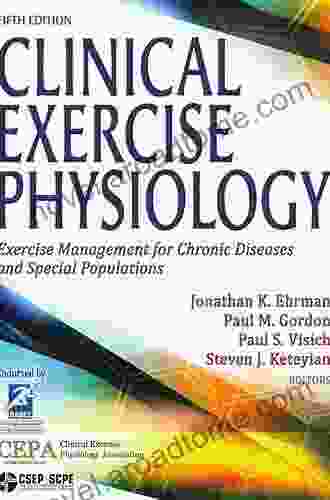Exercise Management for Chronic Diseases and Special Populations: A Revolutionary Approach to Health and Well-being

Chronic diseases and special populations pose unique challenges to individuals' health and well-being. Traditional approaches to healthcare often fall short in addressing the complex interplay of physical, physiological, and psychological factors associated with these conditions. However, a paradigm shift is occurring, placing exercise at the forefront of disease prevention and management.
5 out of 5
| Language | : | English |
| File size | : | 72846 KB |
| Text-to-Speech | : | Enabled |
| Enhanced typesetting | : | Enabled |
| Word Wise | : | Enabled |
| Print length | : | 635 pages |
| Lending | : | Enabled |
The Transformative Power of Exercise
Exercise, once perceived as a luxury or solely for the physically fit, has now emerged as a cornerstone of medical practice for chronic conditions. Extensive research has demonstrated its profound effects on disease progression, symptom management, and overall health outcomes.
For individuals with chronic diseases such as heart disease, diabetes, and arthritis, exercise can reduce symptoms, improve mobility, and enhance cardiovascular health. Regular physical activity has been shown to lower blood pressure, control blood sugar levels, and reduce joint pain. Moreover, exercise can boost mood, reduce stress, and improve overall quality of life.
Special populations, including older adults, people with disabilities, and those with mental health conditions, can also reap significant benefits from exercise. Tailored programs can improve strength, balance, and cognitive function; reduce falls risk; and enhance emotional well-being.
Innovative Strategies and Evidence-Based Practices
Exercise management for chronic diseases and special populations requires specialized approaches and tailored interventions. The field is constantly evolving, with innovative strategies emerging to address specific needs.
Rehabilitation Programs: Structured and supervised exercise programs are essential for individuals recovering from injuries, surgeries, or chronic conditions. These programs aim to restore mobility, improve function, and reduce pain.
Community-Based Initiatives: Promoting physical activity at the community level through public parks, fitness trails, and organized events can foster healthy habits and provide accessible opportunities for exercise.
Telehealth and Home-Based Programs: Remote exercise delivery via video conferencing or home-based equipment allows individuals with limited mobility or geographical constraints to participate in tailored exercise programs.
Patient-Centered Care: Individualized exercise plans that consider the specific needs, preferences, and abilities of each patient are crucial for long-term success. Patient involvement in goal setting and monitoring ensures motivation and adherence.
The Role of Healthcare Professionals
Healthcare professionals, including physicians, nurses, and exercise physiologists, play a vital role in promoting and prescribing exercise for chronic disease management and special populations. They can provide guidance on appropriate exercise types, intensity levels, and duration.
Collaboration between healthcare professionals and exercise specialists is essential to develop safe and effective exercise programs that meet the unique needs of each individual. Regular monitoring and evaluation of progress allows for adjustments and optimization of interventions.
Overcoming Barriers and Promoting Adherence
Adherence to exercise programs can be challenging for individuals with chronic diseases and special populations. Barriers to physical activity include pain, fatigue, fear of injury, lack of motivation, and limited access to resources.
Overcoming these barriers requires a holistic approach that addresses both physical and psychological factors. Strategies such as setting realistic goals, finding enjoyable activities, and providing social support can enhance motivation and increase adherence.
Healthcare professionals and exercise specialists can play a crucial role in motivating patients, providing education and resources, and addressing any concerns or challenges encountered during the exercise journey.
Empowering Individuals Towards Optimal Health
Exercise management for chronic diseases and special populations is not merely a medical intervention but an empowering journey towards optimal health and well-being. By embracing evidence-based practices, tailoring interventions to individual needs, and overcoming barriers, we can unlock the transformative power of exercise for all.
Through this transformative approach, individuals with chronic diseases and special populations can reclaim their physical capabilities, improve their quality of life, and live more fulfilling and independent lives.
Exercise Management for Chronic Diseases and Special Populations represents a paradigm shift in healthcare, recognizing the pivotal role of physical activity in disease prevention and management. By embracing innovative strategies, evidence-based practices, and patient-centered care, healthcare professionals can empower individuals to achieve their full health potential. Let us continue to unlock the transformative power of exercise and strive towards a future where all individuals, regardless of their health status, can live healthier, more fulfilling lives.

5 out of 5
| Language | : | English |
| File size | : | 72846 KB |
| Text-to-Speech | : | Enabled |
| Enhanced typesetting | : | Enabled |
| Word Wise | : | Enabled |
| Print length | : | 635 pages |
| Lending | : | Enabled |
Do you want to contribute by writing guest posts on this blog?
Please contact us and send us a resume of previous articles that you have written.
 Book
Book Novel
Novel Page
Page Chapter
Chapter Text
Text Story
Story Genre
Genre Reader
Reader Library
Library Paperback
Paperback E-book
E-book Magazine
Magazine Newspaper
Newspaper Paragraph
Paragraph Sentence
Sentence Bookmark
Bookmark Shelf
Shelf Glossary
Glossary Bibliography
Bibliography Foreword
Foreword Preface
Preface Synopsis
Synopsis Annotation
Annotation Footnote
Footnote Manuscript
Manuscript Scroll
Scroll Codex
Codex Tome
Tome Bestseller
Bestseller Classics
Classics Library card
Library card Narrative
Narrative Biography
Biography Autobiography
Autobiography Memoir
Memoir Reference
Reference Encyclopedia
Encyclopedia Robin Koontz
Robin Koontz Sonia Sotomayor
Sonia Sotomayor Raymond J Brune
Raymond J Brune Lasa Limpin
Lasa Limpin Victoria Best
Victoria Best Robert Crosby
Robert Crosby Sergey Vakulenko
Sergey Vakulenko Seema Singh
Seema Singh Victoria Connelly
Victoria Connelly Shane Philpott
Shane Philpott Syl Cheney Coker
Syl Cheney Coker Sahera Patel
Sahera Patel Remigius Igweoji
Remigius Igweoji Palmer Jones
Palmer Jones Tony Flannery
Tony Flannery Smart Brain Training Solutions
Smart Brain Training Solutions Samara O Shea
Samara O Shea Susan Rose
Susan Rose Rao H Andavolu
Rao H Andavolu Robert Vane
Robert Vane
Light bulbAdvertise smarter! Our strategic ad space ensures maximum exposure. Reserve your spot today!
 Samuel WardFollow ·7.9k
Samuel WardFollow ·7.9k Francisco CoxFollow ·10.6k
Francisco CoxFollow ·10.6k Max TurnerFollow ·17.1k
Max TurnerFollow ·17.1k W. Somerset MaughamFollow ·11.1k
W. Somerset MaughamFollow ·11.1k Frank MitchellFollow ·10.1k
Frank MitchellFollow ·10.1k Gordon CoxFollow ·13.5k
Gordon CoxFollow ·13.5k James HayesFollow ·15.9k
James HayesFollow ·15.9k Ralph TurnerFollow ·10.4k
Ralph TurnerFollow ·10.4k

 Eli Brooks
Eli BrooksOver 700 Organic Remedies Shortcuts And Tips For The...
: Embracing the Power of...

 Carter Hayes
Carter HayesUnveiling the Unofficial Political Religion of India: A...
Embark on an...

 Colin Richardson
Colin RichardsonOf Colors and Critters: A Journey Through the Animal...
In the tapestry of...

 Harry Hayes
Harry HayesUnveiling the Hidden Truths: Mao, Stalin, and the Korean...
Step into the enigmatic realm of the 20th...

 George Bernard Shaw
George Bernard ShawBand 1b Pink: A Journey Through the World of Reading
Band 1b Pink is a...
5 out of 5
| Language | : | English |
| File size | : | 72846 KB |
| Text-to-Speech | : | Enabled |
| Enhanced typesetting | : | Enabled |
| Word Wise | : | Enabled |
| Print length | : | 635 pages |
| Lending | : | Enabled |














